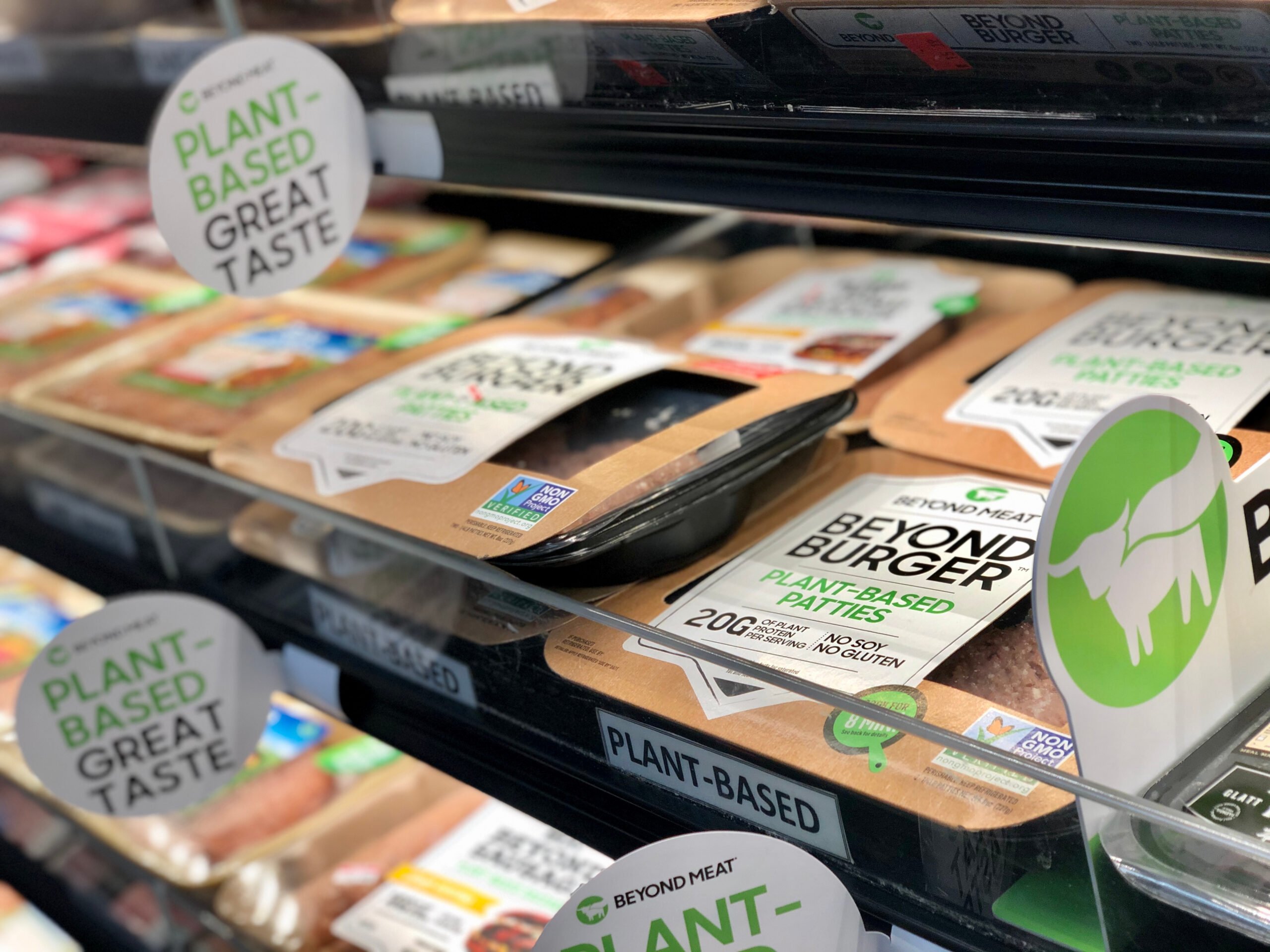
An overview of food label censorship
Learn why censorship of plant-based and cultivated meat product labels is anti-market, unconstitutional, and unnecessary.
Save this document
Protecting fair labeling for alternative proteins
Confronted with the success of plant-based meat and dairy1 and looming competition from cultivated meat,2 a limited number of state legislatures have acted to protect the conventional meat and dairy industries by censoring alternative protein labels. Label censorship has emerged across the country to prohibit the use of meaty terms like “sausage” and “burger” on alternative protein products or to require unappealing and misleading descriptors such as “imitation.” Penalties sometimes include jail time. This label censorship is anti-free market, unconstitutional, and unnecessary.
Label censorship undermines the free market
Label censorship sets a dangerous precedent that will inhibit competition and consumer choice. Under these coercive laws, companies are forced to choose between using valuable resources to produce multiple different labels to comply with various state laws—and using opaque, unappealing language like “coconut beverage” or “veggie disc”—or pulling out of the state entirely. This limits consumer choice and sends the message to innovators and entrepreneurs in every industry that governments are prepared to step in and protect long-standing industries from competition.
Libertarian and conservative think tanks including the R Street Institute, the Cato Institute, and the Heritage Foundation oppose label censorship as an inappropriate government interference in the free marketplace. Daren Bakst, Senior Research Fellow in Agricultural Policy at the Heritage Foundation, says “Consumers, regardless of what ‘meat’ products they choose, should be able to decide what products best meet their needs without government intervention that tries to sway their decisions.”3
American grocers continually add new foods to their shelves. Producers are creating these new foods because consumers demand them. The government should not interfere by penalizing innovative products simply because they compete with more established products.
“Consumers, regardless of what meat products they choose, should be able to decide what products best meet their needs without government intervention that tries to sway their decisions.”
Daren Bakst, Senior Research Fellow in Agricultural Policy, Heritage Foundation
Label censorship is unconstitutional
Label censorship violates producers’ First Amendment right to describe their products in a clear manner consistent with consumer expectations. The First Amendment safeguards the right of speakers to share truthful information and the right of consumers to receive accurate commercial information.4 When it comes to First Amendment issues, courts generally favor more speech, not less, and have struck down state rules that restrict more speech than is reasonably necessary.5
The American Civil Liberties Union of Montana opposed a label censorship bill there, stating that “[it] is an unconstitutional solution in search of a problem” because “[the] restrictions on speech are neither necessary nor appropriate to prevent consumer deception.”6 The ACLU of Mississippi wrote to Governor Phil Bryant noting that Mississippi’s label censorship bill violates producers’ “fundamental right to free speech.”7
Representing Tofurky, The Good Food Institute, the ACLU of Arkansas, and the Animal Legal Defense Fund challenged Arkansas’s label censorship law, asserting that the statute violates the First Amendment.8 The federal court ruled that Tofurky was “likely to prevail” in proving a violation of freedom of speech, and ordered that the state could not enforce the law against Tofurky. The Good Food Institute has also challenged similar laws in Louisiana, Missouri, and Texas.9 In 2020, Virginia Governor Ralph Northam vetoed a milk label censorship bill for this reason (the only legislation vetoed out of 1,291 bills passed that year). Alena Yarmosky, a spokeswoman for the Governor, explained, “While the Governor is very supportive of the dairy industry, he is concerned this bill is unconstitutional and could violate commercial freedom of speech.”10

Resource
The First Amendment right to use clear labels on food
Alternative protein producers have a First Amendment right to describe their products in a clear manner consistent with consumer expectations.
Label censorship is unnecessary
Many legislators use the guise of consumer confusion to advance these protectionist bills. However, there is no evidence to show consumers have a problem understanding plant-based meat and milk labels. Banning conventional meat terms would only increase consumer confusion. The use of everyday language such as “veggie burger” lets people know the product is plant-based and tells them what to expect in terms of a food’s taste, texture, and preparation.11 Everyone knows a burger can be grilled and served in a bun, but who would know what to do with a “plant-based disc”?
Other legislators, including Louisiana Sen. Francis Thompson, have admitted openly and explicitly that label censorship bills are “[meant] to protect the industry.”12 This attempt by legislators to win the favor of their farmer constituents is just toothless pageantry. Label censorship laws, which hurt businesses and result in costly litigation, will do little to help farmers struggling with low prices, drought, corporate consolidation, and supply chain failures.
Rather than wasting taxpayer money on a problem that doesn’t exist, federal and state legislators can better help the farmers and consumers in their states by supporting legislation to promote climate-friendly farming practices.
Conclusion
Alternative proteins offer consumers greater choice at the grocery store. The rising popularity of these products demonstrates that Americans are making informed decisions based on their preferences, tastes, values, health concerns, and so on. Governments should not unlawfully hinder marketplace competition.
References
- Plant-based meat, eggs, and dairy provide the taste and texture of conventional products, but made from plants. Plant-based meats and milks are increasingly popular in the United States, growing almost twice as fast as overall food sales. Grocery store sales of plant-based foods that directly replace animal products reached $7 billion in 2021. See The Good Food Institute (2020). Market Research. https://gfi.org/marketresearch/
- Cultivated meat, genuine animal meat that is produced by cultivating animal cells directly, is being produced by companies around the world and is already on the market in Singapore.
- Daren Bakst, States Shouldn’t Use Protectionist Schemes to Limit Consumer “Meat” Choices, Heritage Foundation, Feb. 28, 2019, https://herit.ag/2Hz58YZ; see also, Letter from R Street Institute, C. Jarrett Dieterle & Shoshana Weissmann, Commercial Speech & Food Labeling (2019), https://bit.ly/2QhQHuY (“Efforts to prohibit the use of commonly accepted phrases like ‘veggie burger’ and ‘plant-based meat’ run contrary to both the First Amendment and the English language. There is no evidence of consumer confusion about products like veggie burgers and other plant-based offerings, which means these prohibitions lack solid legal grounding.”); Simon Lester and Inu Manak, It’s No Use Crying Over Spelt Milk, Cato Institute, Nov. 19, 2018, https://bit.ly/2X8sRYI (“While it’s not clear that changing the [milk] labeling standard would alter consumer behavior in any way, that does not mean that government intervention in this area is harmless. It uses up governing resources, and creates consumer confusion where none currently exists.”).
- Va. State Bd. of Pharmacy v. Va. Consumer Council, 425 U.S. 748, 757 (1976).
- Ocheesee Creamery LLC v. Putnam, 851 F.3d 1228, 1240 (11th Cir. 2017).
- Real Meat Act: Hearing on H.B. 327 Before the H. Comm. on Agric., 2019 Leg., 66th Sess. (Mont. 2019) (statement of Zuri Moreno, ACLU of Montana), https://bit.ly/2WCQEeO (last accessed June 12, 2019).
- Letter from ACLU of Mississippi & The Good Food Institute, Jennifer Riley Collins & Jessica Almy, ACLU-GFI Opposition to H.B. 793 (2019).
- Turtle Island Foods v. Soman, Preliminary Injunction Order, Dkt. No. 25, 19-cv-514-KGB (E.D. Ark., Dec. 11, 2019), available at https://www.aclu.org/legal-document/Turtle-island-foods-v-soman-preliminary-injunction-order
- Complaint for Declaratory and Injunctive Relief, Turtle Island Foods v. Richardson, No. 2:18-cv-4173-FJG (C.D. Mo. Aug. 27, 2018) (No. 1), https://bit.ly/2Q2y124.
- The Good Food Institute (2020). Virginia Governor Vetoes Label Censorship. https://gfi.org/press/virginia-governor-vetoes-label-censorship/
- Producers also have to be able to communicate clearly with consumers about their products to protect consumer health. Cultivated beef is beef, cultivated pork is pork, and cultivated chicken is chicken. For consumers with allergies to meat, a label that can’t use meat terms could be life-threatening, since eating a cultivated beef burger would cause the same allergic reaction as a conventional beef burger.
- Jeremy Alford & Mitch Rabalais, Capitol Views: Senate Getting Real with Grocery Items, Bus. Report, Apr. 16, 2019, https://bit.ly/2EtTPi
Related resources

Virginia governor vetoes label censorship
Following calls from The Good Food Institute to reject legislation that would censor the labels of plant-based milk products, Virginia Governor Ralph Northam has vetoed House Bill 119.
GFI submits recommendations to USDA for cultivated meat and poultry labeling
A fair and sensible regulatory framework is necessary to bring cultivated meat and poultry to market and prevent consumer confusion.
